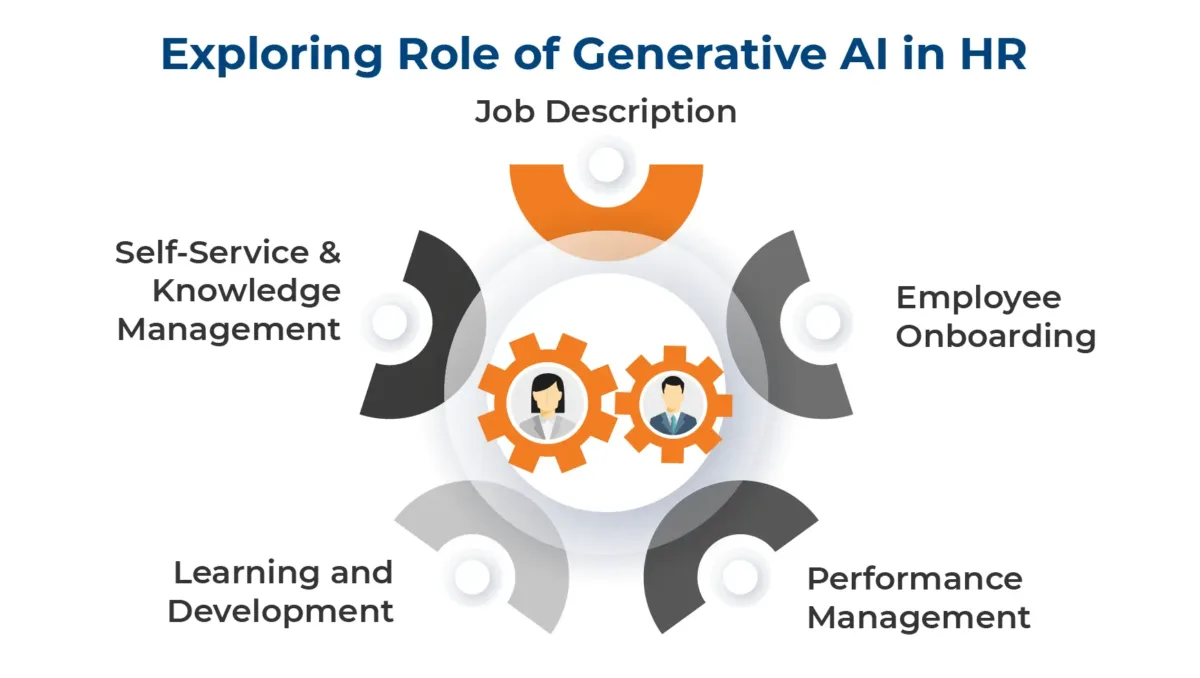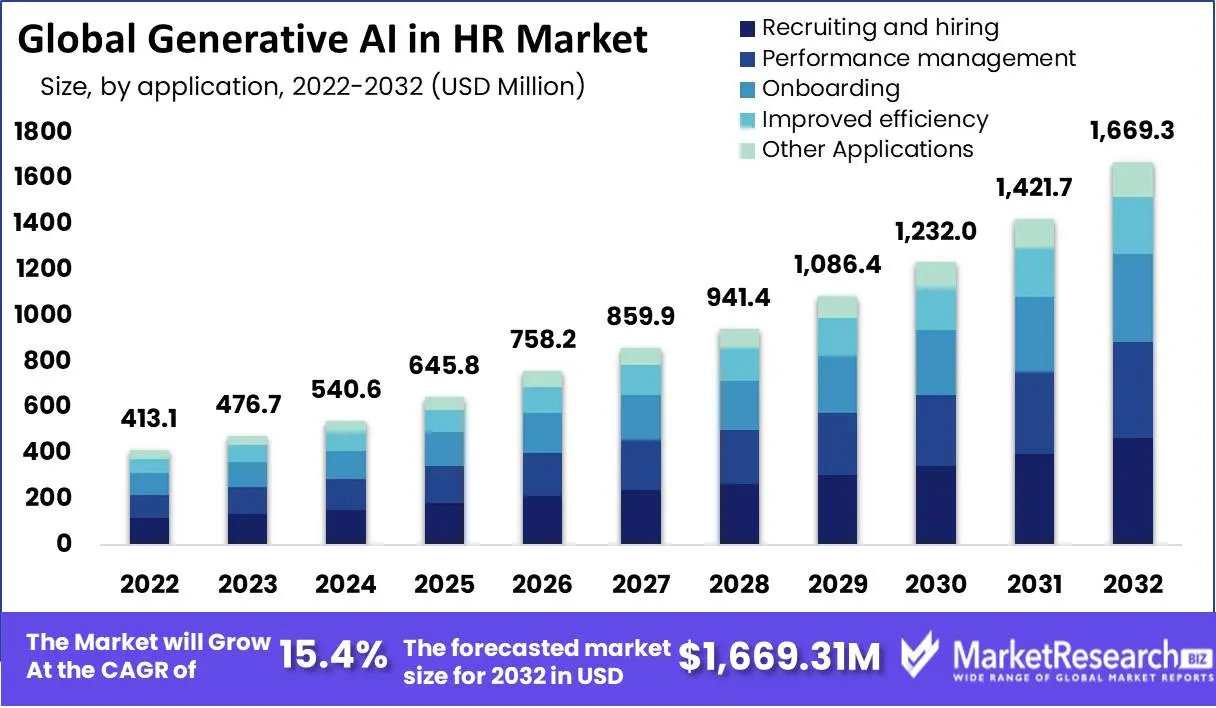The world of Generative AI is impacting the way of work in all business functions. Generative AI utilizes techniques such as deep learning and neural networks to analyze and synthesize complex patterns in data, enabling it to produce realistic images, text, music, and even videos. As the pace of Generative AI accelerates, applications of Generative AI are expected to transform multiple processes and functions, including Human Resources(HR).
HR is more of an integration function than IT or finance, which deals with onboarding and performance management issues. In today’s competitive landscape, organizations are dealing with a competitive labor market, workforce stress and the need to reskill and intelligently move people internally. HR teams also worry about employees’ productivity, experience, and efficiency.
Gaining insights is another challenge the HR team struggles with, as HR data is often scattered across the system. AI here holds the promise to integrate this data for better understanding. Around 87% of employee believe they are operating at their full potential, so there is a dire need to simplify work, reduce the number of systems and save time spent on administrative functions. Generative AI emerges as a fitting tool to address the multifaceted challenges faced by the HR team. According to a report, Generative AI in HR market is expected to hit around USD 2091.4 million by 2032.
In this article, we will explore the impact of Generative AI use cases in HR operations and where it can be implemented to transform the HR process and create a better workplace experience.

-
Job Description
Creating, revising, and refining job descriptions, manuals, and HR policies is often a time-consuming and meticulous process. Generative AI offers a solution by efficiently handling these tasks, enhancing the speed and quality of document creation.
A prevalent challenge faced by HR professionals, especially recruiters, is the presence of biases in hiring practices. An effective way to mitigate these biases and promote inclusivity is to begin with the drafting of inclusive job descriptions using generative AI. These descriptions are designed to eliminate language and job titles that may perpetuate racial or gender biases. Generative AI can analyze skills profiles, employment histories, and other external sources to generate job descriptions tailored to company standards and required competencies, thereby establishing realistic job requirements.
For example,- the HR team can put their requirements for new job descriptions. Generative AI systems can enrich job descriptions by incorporating compelling language, highlighting opportunities for growth and impact, and emphasizing the company’s commitment to diversity and inclusion.
-
Employee Onboarding:
In HR, employee onboarding is a critical process that sets the tone for a new hire’s experience. Automation streamlines repetitive administrative tasks associated with onboarding, such as document processing, form filling, and compliance checks. HR process automation here can generate and distribute required paperwork, initiate background checks, and facilitate the setup of employee accounts and access permissions.
Unlike HR automation, Generative AI leverages machine learning algorithms to analyze data and generate dynamic content tailored to individual preferences and requirements.
Generative AI-powered chatbots serve as virtual assistants, guiding new hires through the onboarding journey and addressing common questions and concerns in real time. These chatbots can provide information about company policies, culture, and benefits, as well as offer personalized recommendations for training and development opportunities based on the new hire’s role and career aspirations. -
Performance Management
In HR organizations, performance management is a critical aspect of organizational success, encompassing processes such as goal setting, performance evaluations, feedback mechanisms, and skill development initiatives. By leveraging HR workflow automation, organizations can facilitate the digitization of performance appraisal forms, enabling seamless data entry, tracking, and analysis.
According to a report, the HR team’s total share of time in performance management is 10%-20%. Moreover, automated notifications and reminders ensure timely completion of performance evaluations, enhancing accountability and transparency across the organization.
Unlike traditional automation, Generative AI in HR can go one step further and analyze vast datasets, including performance metrics, employee feedback, and developmental needs, to generate actionable insights and recommendations. Take for example – Generative AI can generate personalized performance reports for each employee, highlighting areas of strength and opportunities for improvement, thereby facilitating meaningful discussions during performance reviews. -
Learning and Development:
According to a report, 10-20% of HR time is spent on learning and development. In modern workplaces, training and development are vital for fostering employee skills and organizational growth. HR workflow automation can streamline administrative tasks, optimize content delivery and enhance learning outcomes. Generative AI in HR further scales these efforts by creating personalized content, enabling adaptive learning, facilitating interactive dialogue, and offering predictive insights. Suppose an employee working in the content team might receive suggestions to improve their writing skills autonomously on their learning management system based on learning preferences and methods.
Together, automation and Generative AI revolutionize training and development, empowering organizations to nurture talent effectively and stay ahead in a dynamic business landscape.
-
Self-Service & Knowledge Management
Generative AI can enhance organizations’ self-service and knowledge management systems. HR teams can create and curate knowledge base articles, FAQs, and instructional materials using AI algorithms. These resources cover various topics, from IT troubleshooting to HR policies, ensuring employees can access accurate and up-to-date information whenever needed.
Also, the natural language processing capability enables chatbots and knowledge management systems to understand and respond to natural language queries effectively. Employees can ask questions in their own words, and AI algorithms decipher the intent behind the query, retrieving relevant information from the knowledge base. Further, by analyzing user interactions and feedback using Generative AI, HR teams can identify areas for improvement with self-service and knowledge systems.
Scaling HR with Generative AI
Generative AI, along with HR automation, can empower HR professionals to scale their operations and deliver personalized experiences at scale. By harnessing the power of data and advanced algorithms, HR teams can drive innovation, optimize workflows, and unlock valuable insights that drive organizational growth.
In conclusion, integrating generative AI in HR operations signifies a paradigm shift in how organizations manage their most valuable asset: their people. By embracing these innovative technologies, HR professionals can navigate complex challenges, foster employee engagement, and position their organizations for success in the dynamic landscape 2024 and beyond.
The post Exploring Role of Generative AI in HR appeared first on AutomationEdge.
This is a companion discussion topic for the original entry at https://automationedge.com/blogs/role-of-generative-ai-in-hr/
